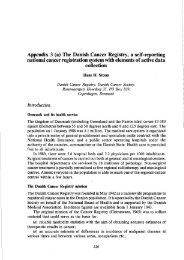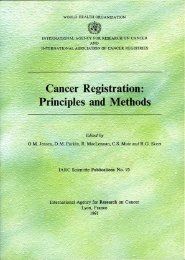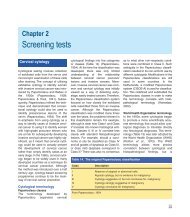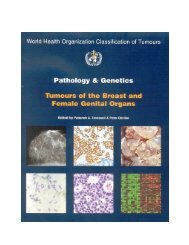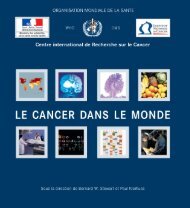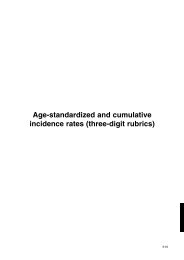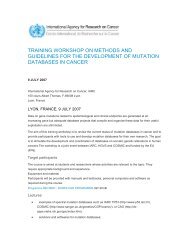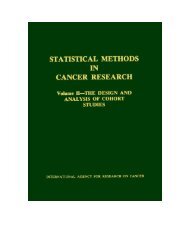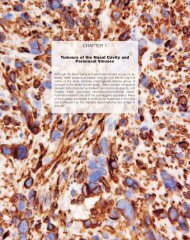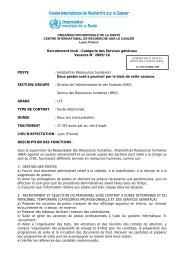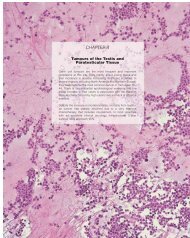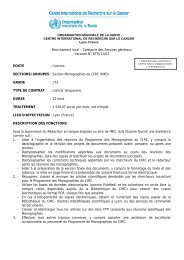world cancer report - iarc
world cancer report - iarc
world cancer report - iarc
You also want an ePaper? Increase the reach of your titles
YUMPU automatically turns print PDFs into web optimized ePapers that Google loves.
COLORECTAL CANCER<br />
SUMMARY<br />
> Cancers of the colon and rectum are<br />
rare in developing countries, but are the<br />
second most frequent malignancy in<br />
affluent societies; over 940,000 cases<br />
occur annually <strong>world</strong>wide.<br />
> A major etiological factor is lifestyle<br />
involving a diet rich in fat, refined carbohydrates<br />
and animal protein, combined<br />
with low physical activity.<br />
>Studies suggest that risk can be reduced<br />
by decreasing meat consumption and<br />
increasing intake of vegetables and fruit.<br />
>Sequential genetic alterations mediate<br />
development of colon <strong>cancer</strong>, the earliest<br />
such change being mutation of the<br />
APC gene.<br />
>Familial clustering has usually a genetic<br />
basis. Typical syndromes include familial<br />
adenomatosis polyposis (FAP) and<br />
hereditary non-polyposis colon <strong>cancer</strong><br />
(HNPCC).<br />
> Colonoscopy is the most reliable means<br />
for early detection. Progressively<br />
improved treatment has resulted in a<br />
five-year survival rate of about 50%.<br />
Definition<br />
The majority of <strong>cancer</strong>s occurring in the<br />
colon and rectum are adenocarcinomas,<br />
which account for more than 90% of all<br />
large bowel tumours.<br />
Epidemiology<br />
Colorectal <strong>cancer</strong> ranks second in terms<br />
of both incidence and mortality in more<br />
developed countries. Nearly 945,000 new<br />
colorectal <strong>cancer</strong> cases are diagnosed<br />
<strong>world</strong>wide each year and colorectal <strong>cancer</strong><br />
is responsible for some 492,000<br />
deaths. There is significant geographical<br />
variation in age-standardized incidence as<br />
well as in cumulative 0-74 year incidence,<br />
198 Human <strong>cancer</strong>s by organ site<br />
Fig. 5.29 Global incidence of colorectal <strong>cancer</strong> in women. Incidence rates are highest in North America,<br />
Western Europe and Australia/New Zealand.<br />
high rates occurring in countries of<br />
Europe, North America, in Australia and,<br />
more recently, in Japan (Fig. 5.29, Table<br />
5.4). Migrant groups rapidly reach the<br />
higher level of risk of the adopted country,<br />
indicating that environmental factors play<br />
an important role in etiology. In North<br />
America, the trend towards increased incidence<br />
is now reversed [1] and a possible<br />
beneficial influence of dietary change<br />
and/or endoscopic polypectomy has been<br />
suggested. In Western Europe, this recent<br />
downward trend has not yet been<br />
observed. Most cases occur after the age<br />
of 60, except in individuals who carry a<br />
genetic predisposition.<br />
Etiology<br />
Colorectal <strong>cancer</strong> most commonly<br />
occurs sporadically and is inherited in<br />
only 5% of cases. Diet is by far the most<br />
important exogenous factor so far identified<br />
in the etiology of colorectal <strong>cancer</strong><br />
[2]. It has been estimated that 70% of<br />
colorectal <strong>cancer</strong>s could be prevented by<br />
nutritional intervention; various promot-<br />
< 3.8 < 7.7 < 12 < 21.2<br />
Age-standardized incidence/100,000 population<br />
< 43.4<br />
ing and protective factors have been<br />
identified in cohort and case-control<br />
studies [3]. There is convincing evidence<br />
that a diet high in calories and rich in animal<br />
fats, most often as red meat, and<br />
Cumulative<br />
incidence (%)<br />
Country Male Female<br />
Black, USA 5.60 4.22<br />
White, USA 4.98 3.38<br />
Denmark 4.48 3.53<br />
Netherlands 4.25 3.25<br />
Osaka, Japan 4.03 2.28<br />
Qidong China 1.13 0.29<br />
Khon Kaen,Thailand 1.06 0.64<br />
Table 5.4 Cumulative incidence of colorectal <strong>cancer</strong>.<br />
The sum of incidence rates for all ages 0-74<br />
provides a measure of the risk of developing colorectal<br />
<strong>cancer</strong> over a life span, in the absence of<br />
any other cause of death.



